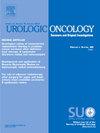Exosome: The hidden messengers in cancer detection and immunotherapy
IF 2.3
3区 医学
Q3 ONCOLOGY
Urologic Oncology-seminars and Original Investigations
Pub Date : 2025-07-31
DOI:10.1016/j.urolonc.2025.07.006
引用次数: 0
Abstract
Cancer continues to pose a significant global health challenge, driving the need for innovative approaches in early detection and treatment management. Exosomes, small extracellular vesicles secreted by various cell types, play a pivotal role in intercellular communication by transferring molecular cargo between donor and recipient cells. They have emerged as key players in cancer progression and therapy. Exosomes contribute to tumor growth by mediating immune suppression, drug resistance, and metastasis. Yet, their distinctive properties also present them as valuable tools for cancer diagnosis. Tumor-derived exosomes, abundant in body fluids, are promising candidates for liquid biopsies, offering non-invasive biomarkers that can aid in cancer detection, prognosis, and real-time monitoring of disease progression. Beyond diagnostics, exosomes are at the forefront of cancer immunotherapy, particularly in developing exosome-based vaccines and targeted therapies. Their capacity to deliver molecular cargo directly to cancer or immune cells allows personalized and highly effective cancer treatments. This review explores the current understanding of exosomes in cancer biology, underscores their emerging diagnostic potential, and examines their transformative role in advancing future cancer immunotherapy strategies.
外泌体:癌症检测和免疫治疗中的隐藏信使。
癌症继续对全球健康构成重大挑战,因此需要在早期发现和治疗管理方面采取创新办法。外泌体是由各种细胞类型分泌的细胞外小泡,通过在供体细胞和受体细胞之间传递分子货物,在细胞间通讯中发挥关键作用。它们已经成为癌症进展和治疗的关键角色。外泌体通过介导免疫抑制、耐药和转移来促进肿瘤生长。然而,它们独特的特性也使它们成为癌症诊断的宝贵工具。肿瘤来源的外泌体富含体液,是液体活检的有希望的候选者,提供非侵入性生物标志物,可以帮助癌症检测、预后和实时监测疾病进展。除诊断外,外泌体处于癌症免疫治疗的前沿,特别是在开发基于外泌体的疫苗和靶向治疗方面。它们将分子货物直接运送到癌症或免疫细胞的能力使得个性化和高效的癌症治疗成为可能。这篇综述探讨了目前对外泌体在癌症生物学中的理解,强调了它们新兴的诊断潜力,并检查了它们在推进未来癌症免疫治疗策略中的变革作用。
本文章由计算机程序翻译,如有差异,请以英文原文为准。
求助全文
约1分钟内获得全文
求助全文
来源期刊
CiteScore
4.80
自引率
3.70%
发文量
297
审稿时长
7.6 weeks
期刊介绍:
Urologic Oncology: Seminars and Original Investigations is the official journal of the Society of Urologic Oncology. The journal publishes practical, timely, and relevant clinical and basic science research articles which address any aspect of urologic oncology. Each issue comprises original research, news and topics, survey articles providing short commentaries on other important articles in the urologic oncology literature, and reviews including an in-depth Seminar examining a specific clinical dilemma. The journal periodically publishes supplement issues devoted to areas of current interest to the urologic oncology community. Articles published are of interest to researchers and the clinicians involved in the practice of urologic oncology including urologists, oncologists, and radiologists.

 求助内容:
求助内容: 应助结果提醒方式:
应助结果提醒方式:


